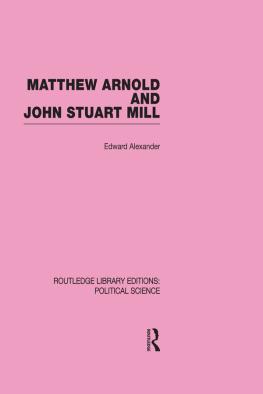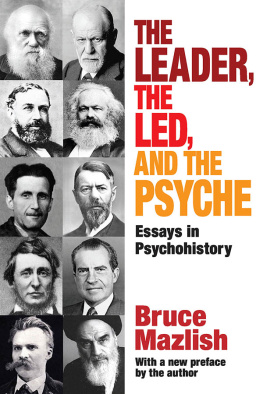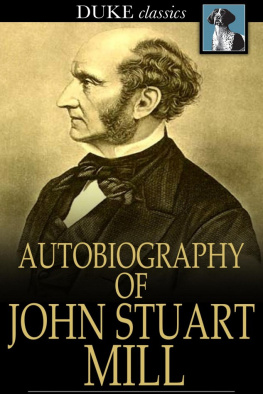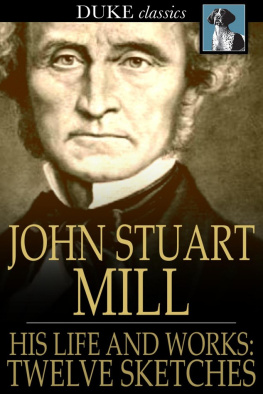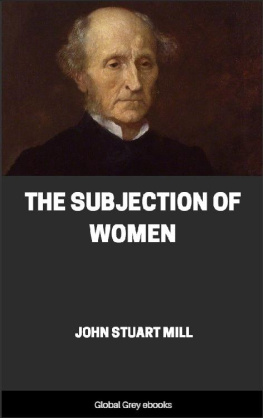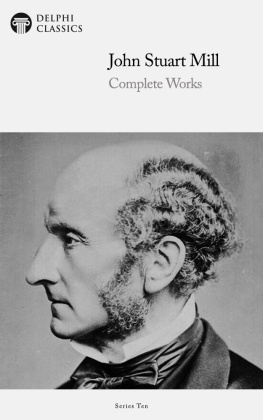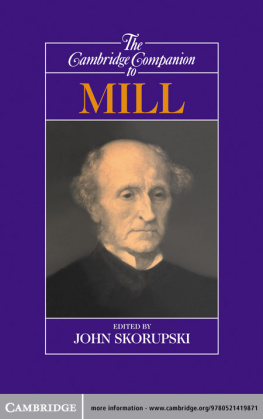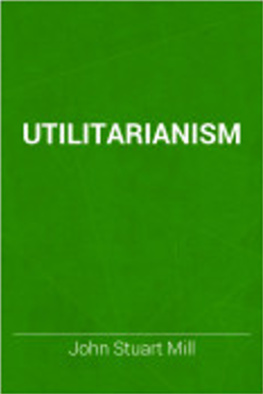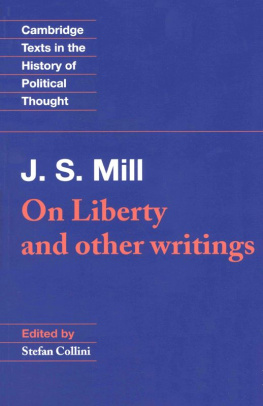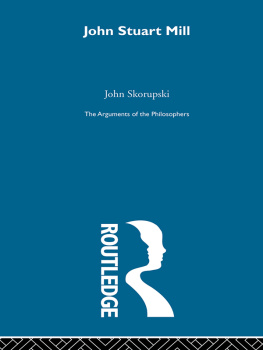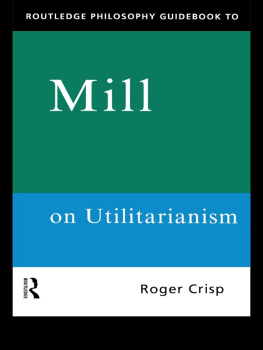ROUTLEDGE LIBRARY EDITIONS: POLITICAL SCIENCE
Matthew Arnold and John Stuart Mill
First published 1965
This edition first published in 2010
by Routledge
2 Park Square, Milton Park, Abingdon, Oxon, OX14 4RN
Simultaneously published in the USA and Canada
by Routledge
270 Madison Avenue, New York, NY 10016
Routledge is an imprint of the Taylor & Francis Group, an informa business
1965 Edward Alexander
All rights reserved. No part of this book may be reprinted or reproduced or utilised in any form or by any electronic, mechanical, or other means, now known or hereafter invented, including photocopying and recording, or in any information storage or retrieval system, without permission in writing from the publishers.
British Library Cataloguing in Publication Data
A catalogue record for this book is available from the British Library
ISBN 10: 0-415-49111-8 (Set)
ISBN 13: 978-0-415-49111-2 (Set)
ISBN 10: 0-415-55550-7 (Volume 15)
ISBN 13: 978-0-415-55550-0 (Volume 15)
Publishers Note
The publisher has gone to great lengths to ensure the quality of this reprint but points out that some imperfections in the original copies may be apparent.
Disclaimer
The publisher has made every effort to trace copyright holders and would welcome correspondence from those they have been unable to trace.
First published 1965
by Routledge & Kegan Paul Limited
Broadway House, 68-74 Carter Lane London, E.C.4
Printed in Great Britain
by R. & R. Clark, Limited
Edinburgh and London
Copyright Edward Alexander 1956
No part of this book may be reproduced in any form without permission from the publisher, except for the quotation of brief passages in criticism
To the Memory of My Grandmother
FRADEL LEVY
The author wishes to thank the following publishers for permission to quote from works of which they hold the copyright: The Clarendon Press for R. P. Anschutzs The Philosophy of J. S. Mill, E. L. Woodwards The Age of Reform, and The Poems of Arthur Hugh Clough, ed. H. F. Lowry, A. L. P. Norrington, and F. L. Mulhauser; Macmillan for Michael Packes The Life of John Stuart Mill, Oxford University Press for M. H. Abrams The Mirror and the Lamp, G. M. Youngs Victorian England: Portrait of an Age, and The Letters of Matthew Arnold to Arthur Hugh Clough, ed. H. F. Lowry; and University of Toronto Press for The Earlier Letters of John Stuart Mill: 1812-1848, ed. F. E. Mineka.
Preface
T HE present volume is an attempt to show the confluence of humanism and liberalism by comparing the chief representatives of the two traditions in Victorian England. I have made Matthew Arnold the spokesman for humanism and John Stuart Mill the spokesman for liberalism, but I have also tried to show to what a considerable extent each shared the convictions of the other; how much of a liberal Arnold was and how much of a humanist Mill was. I have tried to discover the causes of past conflicts between liberalism and humanism in order to suggest how they may eventually complement each other, as, indeed, Arnold and Mill hoped they would.
The unifying purpose of the writings of both Arnold and Mill was to prepare their culture for its imminent democratization. Almost alone among their contemporaries in the world of letters, they accepted the inevitability, and urged the desirability, of democracy. But they feared that unless proper preparation were made, all those virtues which were not the inevitable accompaniment of democracy might be lost. Arnold and Mill believed that high cultural ideals, respect for intelligence, love of heroism, the idea of distinction itself, were not natural to the democratic spirit. But they did not believe that these virtues were incompatible with democracy; and although they had very different ideas of how to do it, both were convinced that democracy might be wedded to a high ideal of culture, and that, as Mill wrote in 1836:
All that we are in danger of losing we may preserve, all that we have lost we may regain, and bring to a perfection hitherto unknown; but not by slumbering, and leaving things to themselves, no more than by ridiculously trying our strength against their irresistible tendencies: only by establishing counter-tendencies, which may combine with those tendencies, and modify them.
E DWARD A LEXANDER
Seattle, Washington .
October, 1964.
Acknowledgements
I AM indebted to several persons and institutions for assistance in the writing of this book.
For early encouragement and advice, I am indebted to Professor G. Robert Stange and to Professor Lionel Trilling. For his patience, kindness, and guidance at every stage of the work, I am indebted to Professor J. G. Levenson.
For their support of my work in the form of fellowships and grants, I am indebted to the University of Minnesota, the University of Washington, and the U.S. Educational (Fulbright) Commission. For a grant in aid of publication, I am indebted to the Agnes Anderson Fund of the University of Washington.
For permitting and helping me to examine manuscript materials, I am indebted to the librarians of Kings College, Cambridge, Somerville College, Oxford, and the London School of Economics.
For suggestions and help of various kinds, I am indebted to Miss Ruth Altmann, Miss Muriel Dashwood, Professor Irvin Ehrenpreis, Mr. Peter M. Jackson, Professor Francis E. Mineka, Professor Samuel H. Monk, Professor John M. Robson, Professor Bernard Saffran, Mrs. Arlene Segal.
For her assistance in more ways than I can enumerate, I am indebted to my wife, Leah Alexander.
Contents
I
Representative Men
From whom can we more properly derive a general name for those degradations of Hellenism than from that distinguished man, who, by his intelligence and accomplishments, is in many respects so admirable and so truly Hellenic, but whom his dislike for the dominant sect, as he calls the Church of England seems to transport with an almost feminine vehemence of irritation? What can we so fitly name the somewhat degenerated and inadequate form of Hellenism as Millism?
MATTHEW ARNOLD
A propos, why does Maudsley charge me with disparaging physiology either in itself or in its application to mind? It is like Matthew Arnold enumerating me among the enemies of culture.
JOHN STUART MILL
M ATTHEW A RNOLD and John Stuart Mill are the representative figures of the Victorian age because in them the conflicting forces of the age came closest to attaining a kind of equilibrium. In their attempts to reconcile the ancient and the modern, literature and science, above all culture and democracy, Arnold and Mill were trying to synthesize the partial and diverse elements of their age into a unified whole which would survive into the next.
The names of Arnold and Mill were not linked in their age, and the reasons why this was so are not hard to find. Arnold was a poet with an avowed distaste for systematic thought and systematic thinkers, Mill a philosopher whose System of Logic was the basis of scientific and philosophical investigation at British universities for nearly half a century. Arnold was the who had maintained that pushpin was as good as, nay, for the majority of people, better than, poetry. Arnold was the son and pupil of Dr. Arnold of Rugby, Mill the son and pupil of the contentious Scot, James Mill.
Contemporaries of Arnold and Mill seem to have thought of them as the representatives of opposed schools of thought. Victorians who thought of themselves as the defenders of ancient civilization against modern barbarism usually recognized in Arnold their ally, in Mill their enemy. To Ruskin, for example, Arnold probably seemed a fellow seeker, albeit one gone astray, after the meaning of Homer and the Grand Style; but Mill appeared, as we know from Ruskins furious and ill-advised attacks upon him, the naive propounder of a system of political economy the inhumane premises of which he dared not follow to their logical consequences. For Newman, Arnold and Mill were the spiritual offspring of two of his greatest enemies, Thomas Arnold and Jeremy Bentham; but whereas Newman had nothing but scorn and words of abuse for Utilitarians, he was flattered by the admiration of Matthew Arnold, whom he was delighted to meet.

